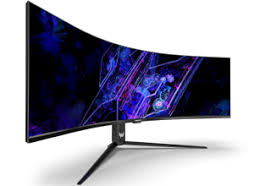Gigabyte details its AORUS F032UP2 OLED monitor with DisplayPort 2.1

DisplayPort 2.1 for gaming OLED monitor
Gigabyte is lifting the curtain on its highly anticipated QD-OLED monitor lineup.

The upcoming QD-OLED lineup from AORUS will be among the first to feature the highly anticipated DisplayPort 2.1 implementation. Like with all new technologies, the progress of adding this standard to gaming monitors is slow, to the point where one is starting to doubt if we see broader implementation at scale in the near future.



Gigabyte Aorus FO32U2P, Source: Gigabyte
AORUS seems to be focused on not only delivering DisplayPort 2.1 but also being the first company to offer the fastest version. As a reminder, the FO32U2 and F032U2P are very much the same monitors, but in terms of DisplayPort support they are entirely different. The former supports DisplayPort 1.4, while the “P” variant has DisplayPort 2.1. Furthermore, it supports UHBR20 mode, the highest bandwidth from all DP2.1 monitors like Samsung’s Odyssey Neo G9 G95NC or Asus ROG Swift PG32UQXR which only support UHBR13.5 and UHBR10 respectively. Worth noting that the former is an ultra-wide monitor and the latter is using Mini-LED.

Gigabyte Aorus FO32U2P, Source: Gigabyte
The F032U2(P) are 31.5-inch monitors equipped with a Samsung QD-OLED panel. We are looking at 4K resolution with 240Hz refresh rate. All the most high-end monitors on the market already these panels, but AORUS monitor stands out by supporting DP2.1 and the high bandwidth format.
| 4K 240Hz QD-OLED Monitors | ||||||
|---|---|---|---|---|---|---|
| VideoCardz | Alienware 32 4K QD-OLED AW3225QF | ASUS ROG Swift OLED PG32UCDM | Gigabyte Aorus FO32U2P | HP 32″ Omen Transcend | Samsung Odyssey OLED G8 | MSI MPG 321URX |
| Picture |  |
 |
 |
 |
 |
 |
| Size, Curvature | 31.6″, curved | 31.5″, flat | 31.5″, flat | 31.5″, flat | 32″, flat | 31.5″, flat |
| 4K 240Hz | 4K 240Hz | 4K 240Hz | 4K 240Hz | 4K 240Hz | 4K 240Hz | |
| Connectivity | DP 1.4, HDMI 2.1 | DP 1.4, HDMI 2.1 | DP 2.1 UHBR20, HDMI 2.1 | DP 2.1, HDMI 2.1 | DP 1.4, HDMI 2.1 | DP 1.4, HDMI 2.1 |
| Certification | VESA DisplayHDR True Black 400 | VESA DisplayHDR 400 True Black | VESA ClearMR 13000,DisplayHDR True Black 400 | VESA DisplayHDR True Black 400 | VESA DisplayHDR True Black 400 | VESA ClearMR 13000,DisplayHDR True Black 400 |
| Warranty | 3-year | 3-year | TBC | TBC | TBC | 3-year |
| MSRP | $1,200 | $1,300 | TBC | TBC | TBC | $950 |
According to Gigabyte, the FO32U2P will also be equipped with Mini-DisplayPort 2.1, which will again be the first. In comparison to the non-P version, it will also support higher USB Type-C power deliver of 65W instead of 18W. Both monitors will also feature DisplayHDR True Black 400.



Gigabyte Aorus FO27Q3, Source: Gigabyte
Gigabyte is also giving more details on its 27-inch FO27Q3 monitor. This is a 1440p resolution screen with 360 Hz refresh rate and it is also based on a QD-OLED panel from Samsung. It is said to support DP 1.4, two HDMI 2.1 and USB Type-C with 18W power deliver.
Gigabyte is yet to confirm pricing and release date.
| AORUS QD-OLED Monitors | ||
|---|---|---|
| Aorus FO27Q3 | Aorus FO32U2 | Aorus FO32U2P |
| Size | 27 inches | 31.5 inches |
| Panel | Samsung QD-OLED, anti-reflection | |
| Resolution (format) | 2,560 × 1,440 (16:9) | 3,840 × 2,160 (16:9) |
| Refresh rate | 360Hz | 240Hz |
| Response time (GtG) | 0.03ms | |
| Color depth/DC-P3 | 10 bits, 99% | |
| Contrast | 1,500,000:1 | |
| Brightness | 250 cd/m² (entire area), 400 cd/m² (10%) | |
| Connections | 1 × DP 1.42 × HDMI 2.11 × USB-C upstream (DP, 18 W)2 × USB 3.0 downstream1 × USB 3.2 upstream1 × Headphones1 × Microphone | 1 × DP 2.1 UHBR201 × Mini-DP 2.11 × DP Out2 × HDMI 2.11 × USB-C Upstream (DP, 65 W)2 × USB 3.2 Downstream1 × USB 3.2 Upstream1 × Headphones1 × Microphone |
| Speakers/KVM/RGB | ✓/✓/✓ | |
| Ergonomics | Height adjustable, tilt, swivel, pivot |
Source: Gigabyte via ComputerBase


 United Kingdom
United Kingdom Argentina
Argentina  Australia
Australia  Austria
Austria  Brazil
Brazil  Canada
Canada  Germany
Germany  Ireland
Ireland  Italy
Italy  Malaysia
Malaysia  Mexico
Mexico  New Zealand
New Zealand  Poland
Poland  South Africa
South Africa  United States
United States 


























